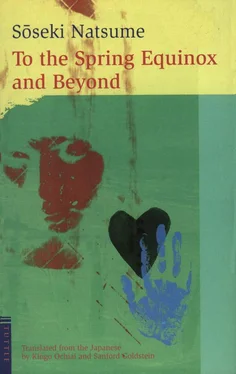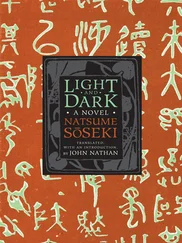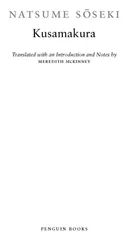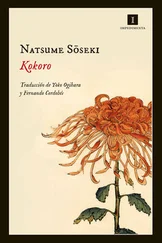Natsume Soseki - To the Spring Equinox and Beyond
Здесь есть возможность читать онлайн «Natsume Soseki - To the Spring Equinox and Beyond» весь текст электронной книги совершенно бесплатно (целиком полную версию без сокращений). В некоторых случаях можно слушать аудио, скачать через торрент в формате fb2 и присутствует краткое содержание. Год выпуска: 2006, Издательство: Tuttle Publishing, Жанр: Классическая проза, на английском языке. Описание произведения, (предисловие) а так же отзывы посетителей доступны на портале библиотеки ЛибКат.
- Название:To the Spring Equinox and Beyond
- Автор:
- Издательство:Tuttle Publishing
- Жанр:
- Год:2006
- ISBN:нет данных
- Рейтинг книги:5 / 5. Голосов: 1
-
Избранное:Добавить в избранное
- Отзывы:
-
Ваша оценка:
- 100
- 1
- 2
- 3
- 4
- 5
To the Spring Equinox and Beyond: краткое содержание, описание и аннотация
Предлагаем к чтению аннотацию, описание, краткое содержание или предисловие (зависит от того, что написал сам автор книги «To the Spring Equinox and Beyond»). Если вы не нашли необходимую информацию о книге — напишите в комментариях, мы постараемся отыскать её.
To the Spring Equinox and Beyond — читать онлайн бесплатно полную книгу (весь текст) целиком
Ниже представлен текст книги, разбитый по страницам. Система сохранения места последней прочитанной страницы, позволяет с удобством читать онлайн бесплатно книгу «To the Spring Equinox and Beyond», без необходимости каждый раз заново искать на чём Вы остановились. Поставьте закладку, и сможете в любой момент перейти на страницу, на которой закончили чтение.
Интервал:
Закладка:
He hurried to Hongo Street with a feeling of pressure under his right armpit caused by the curving angle of the snakehead. On reaching the street, he removed the stick from under his cloak and gazed at the head of the snake. He took a handkerchief from his kimono sleeve and wiped the dust off the cane from top to bottom. This done, he held the stick in his right hand as if it were any ordinary cane and walked on wielding it vigorously.
On the streetcar he sat with hands folded over the snakehead, his chin resting on them. He sighed with relief as he looked back over the great pains he had been taking but which had now come to a brief halt. At the same time, his misgivings began again about the undertaking at the carstop he was now heading for. On reflection it was totally beyond his reasoning power how a walking stick he had exerted so much effort to carry off— almost as if committing a theft — could be useful in identifying a mole between a pair of eyebrows. He had merely followed the old woman's words and had sought as best he could something that was at once his own and another's, was long and short, and apparently went out and came in, and he was now carrying it with him as she had advised.
This mysterious-looking, yet actually quite commonplace and exceedingly light bamboo cane, whether set down, held in the hand, or hidden under a sleeve— what use, he wondered, could it ever be in locating that strange person? In this moment of doubt he glanced around the car, his face as blank as that of a person who has just shaken off an attack of ague. He felt ashamed of the efforts he had exerted a short while back with an ardor so impatient that it seemed as if steam had been rising from the very pores of his head. To distract himself from these thoughts, he laid firmer hold of the stick and lightly tapped the streetcar floor with it.
Soon he reached his destination. He hurriedly went back toward Ogawamachi from the carstop near the YMCA building. It was still only about a quarter to four. He crossed to the other side of the street, which was filled with the noise of pedestrians and streetcars, and there found a police box. He stood beside a red mailbox in a pose similar to a policeman's before his station and looked at the thoroughfare running straight south and at another broad street into which the former turned, curving gently left and right at the juncture.
Having thus surveyed the stage on which he was to soon play an active role, Keitaro now began to verify the whereabouts of the streetcar stop.

A dozen yards east of the mailbox he saw a red iron pole with characters in white paint that read "Ogawamachi." If only he stood there and waited, he could at least say on his own behalf that despite the possibility of missing the man in question among these jostling crowds, he had been at his post on time. Having gained this much assurance, he left the marked pole to look at his surroundings.
A porcelain dealer's shop built in the warehouse style was directly behind him. Under the eaves a box in the shape of a framed tablet and containing many small sake cups arranged in rows had been put up. Hanging there was a metal birdcage to the outside of which were tied innumerable porcelain cups for birdseed. Next to this shop was one dealing in leather goods. Its most conspicuous decoration was a large tiger fur with lifelike eyes and genuine claws and a border of red woolen cloth. Keitaro stood gazing at the animal's amber eyes. At the end of a long narrow muffler of snow-white fur was what looked to Keitaro like a small badger's humorous face.
Keitaro pulled out his watch, calculated the time remaining, and then moved on to the next shop, a jeweler's. He peered into the show window where in addition to gold rings and various cuff links he found a brilliant display of such items as a translucent rabbit carved from agate, some square-shaped personal seals made of amethyst, negake hair ornaments of green jade, and malachite fasteners.
Glancing into these shops one after another, Keitaro walked along until he had passed the Tenkado department store and came to a cabinetmaker's. At that moment he saw a streetcar which had come from behind him stop short, just opposite the pavement he was walking along.
Thinking there might possibly be another streetcar stop with the same name, he cut across the street and approached a foreign goods store at the corner of a narrow side street. There, written in white on another iron pole were the characters "Ogawamachi," the same as on the previous pole he had seen.
To double-check, he waited at this corner for a few streetcars to pass. The first was for Aoyama, the second for Shinjuku via Kudan. All these cars came straight from Mansei Bridge, so he was reassured that he need not worry the man in the fedora would get off at this stop. But just as Keitaro was retracing his steps to return to his former position on the other side of the street, a streetcar from the south swerved at the corner of Mitoshirocho and stopped near the spot Keitaro was standing at. It was only when he read the word "Sugamo" written in black characters above the motorman's head that he realized for the first time how careless he had been.
A passenger taking a streetcar from Mita through Marunouchi to get off at Ogawamachi would, after passing over Kanda Bridge, find the car turning either to the left and would therefore get off at the stop Keitaro was now standing at, or would find the car turning right and would get off in front of the porcelain shop Keitaro had checked a short while ago. And since each spot with its white sign indicated that the stop was Ogawamachi, Keitaro could not be certain at which of the two his man in the black fedora would alight.
With his eyes he measured the distance between the two red streetcar poles. Not more than a hundred yards. Doubtful of his powers of observation in checking even one place, Keitaro felt that no matter how highly he would have liked to estimate his own resourcefulness, it was absolutely impossible to demand the skill in himself to cover two areas thoroughly even though the distance between them was not great.
The streetcar line that Keitaro usually took from the area in which he lived was the one connecting Hongo to Mita. Not having known until that moment that there was another line that ran from Sugamo through Suidobashi to Mita, he couldn't help regretting his heedlessness. Totally at a loss, he suddenly thought as a last resort of asking Sunaga for help. But already it was seven minutes to four. Although Sunaga's house was on a side street not too far away, Keitaro knew he would not have sufficient time to rush there and make his friend comprehend the situation. Even if he had the time, should the gentleman get off at the stop Sunaga was guarding, Sunaga would then have to inform Keitaro about it somehow or other. A hand raised or the wave of a handkerchief would not be easily recognizable among a dense crowd of people. To make it absolutely certain that Keitaro would get the message, his friend would have to cry out so vehemently that it might startle all the pedestrians along the street. Yet Keitaro couldn't expect the straight-laced Sunaga to do such an eccentric thing even in an extraordinary situation. And even if Sunaga did agree to do it, perhaps the man in the black fedora would have disappeared before Keitaro had run across to Sunaga's station.
Having so reasoned, Keitaro was driven to take his own chances; consequently, he made up his mind to guard only one of the two stops.

Keitaro had made his decision but not without feeling a certain uneasiness, for actually it amounted to no more than remaining lazily where he was while knowingly doing his job without regard to its success. He craned his neck to look again at the stop toward the east. Whether because of its location or the direction it was in or possibly out of his own habit of getting on and off at that stop, it seemed to him much livelier. He felt that the man he was searching for was more likely to get off at that spot.
Читать дальшеИнтервал:
Закладка:
Похожие книги на «To the Spring Equinox and Beyond»
Представляем Вашему вниманию похожие книги на «To the Spring Equinox and Beyond» списком для выбора. Мы отобрали схожую по названию и смыслу литературу в надежде предоставить читателям больше вариантов отыскать новые, интересные, ещё непрочитанные произведения.
Обсуждение, отзывы о книге «To the Spring Equinox and Beyond» и просто собственные мнения читателей. Оставьте ваши комментарии, напишите, что Вы думаете о произведении, его смысле или главных героях. Укажите что конкретно понравилось, а что нет, и почему Вы так считаете.












